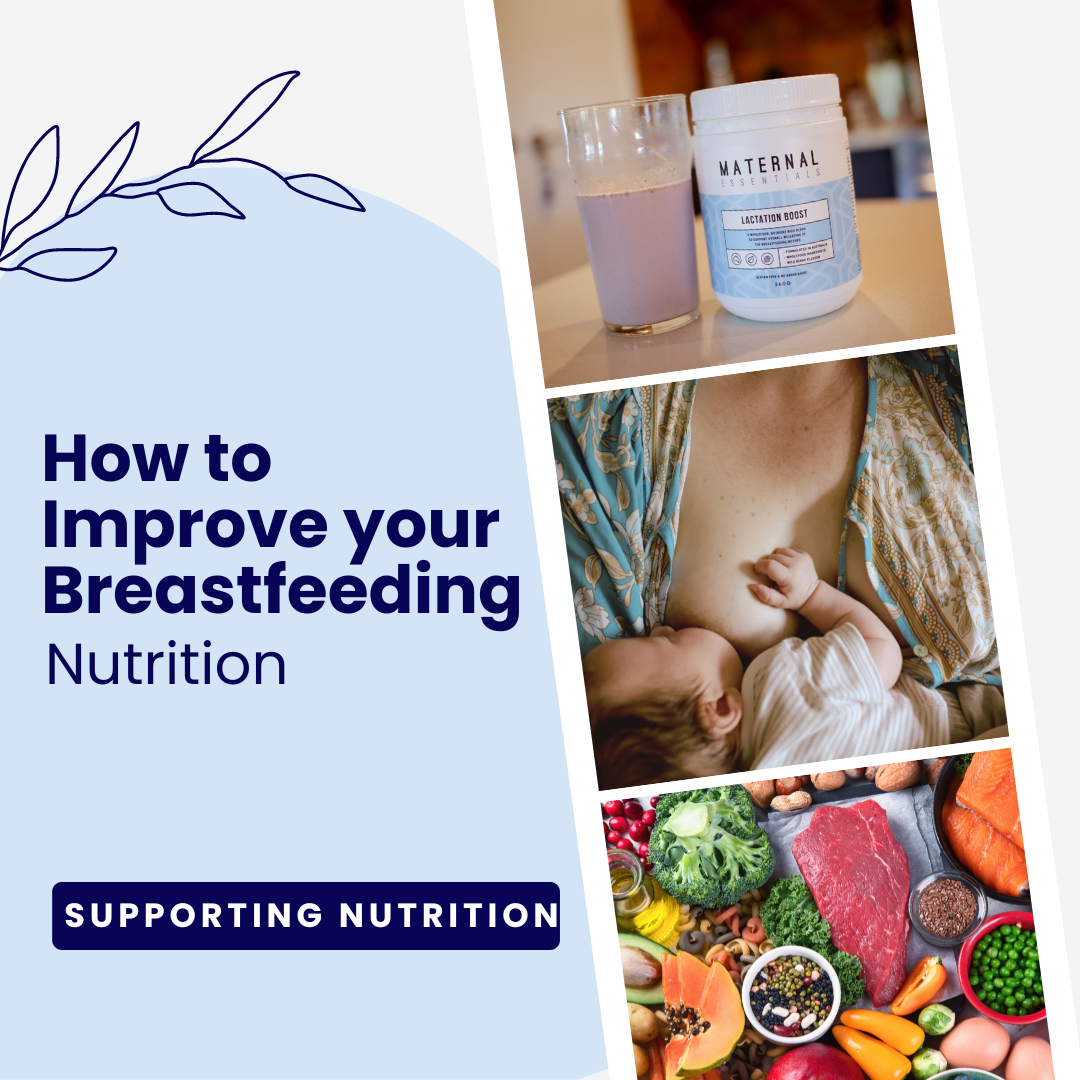Have you been asking "What should I be eating while breastfeeding?"
Joelleen Winduss-Paye, a holistic IBCLC and naturopath shares how to improve your diet and increase milk supply while breastfeeding
Hydration: The Core of a Balanced Diet & Optimal Milk Supply while Breastfeeding
Producing breast milk is a demanding task for your body, and staying adequately hydrated is crucial to support this process.
The general guideline is to aim for three to four liters of water per day. To make tracking your water intake easier, consider using drink bottle with hour markers to remind you to refill. Having multiple drink bottles strategically placed around your house, especially near your breastfeeding stations, can be incredibly helpful.
If you struggle to meet your hydration goals, consider using an electrolyte powder to make water more appealing or to ensure that you receive the necessary electrolytes.

Food: Nutrition for your Breastfeeding Journey
On average, you should aim for an additional 500 calories per day while breastfeeding.
These extra calories are not only for producing breast milk but also to provide the necessary nutrients for your baby. Prioritise meals rich in protein, especially during the morning. Aiming for 25 to 30 grams of protein in each main meal is a good guideline, which can vary depending on your body weight.In the early days of motherhood, when time and energy are limited, single-handed snacks become a lifesaver. Prepare snacks that are easy to grab and are protein-rich to keep your energy levels up.
Macronutrients required for breastfeeding:
During breastfeeding, protein requirements are notably increased to support the production of breast milk and ensure its quality.
On average, breastfeeding mothers should aim to consume approximately 25 to 30 grams of protein per meal, depending on their body weight and individual needs.
Protein is crucial as it provides the essential amino acids necessary for the growth and development of the baby, as well as the maintenance and repair of maternal tissues. Ensuring an adequate intake of protein-rich foods such as lean meats, poultry, fish, eggs, dairy products, legumes, and nuts is vital to meet these heightened nutritional demands and promote a healthy breastfeeding journey.

Micronutrients required for breastfeeding:
Micronutrients (vitamins and minerals) are essential during breastfeeding to ensure the health and well-being of both the mother and her baby. While macronutrients like carbohydrates, proteins, and fats provide energy and structural components, micronutrients play a critical role in various metabolic processes and overall health.
Key micronutrients needed in higher amounts during breastfeeding include:
Iodine: is essential for cognitive development of baby, which relies on your breastmilk as their only source of iodine until they begin solids
Vitamin D: is crucial for bone health and immune function in both mother and baby
Calcium: supports the development of the baby's bones and teeth & maintains your bone health while breastfeeding
Iron: is essential for preventing iron deficiency which can impact your milk supply
Folate: is vital for DNA synthesis and the formation of new cells.

Nutritious & Easy Meal Ideas while Breastfeeding:
Breakfast:
Consider switching to an egg-based breakfast, with two to three eggs providing substantial protein to balance your blood sugar levels. Enjoy your eggs alongside sourdough toast, left over roast veggies or a bowl of fresh fruit.
Lunch and Dinner:
Plan balanced meals with protein, fats, fibre and carbohydrates. Lean towards whole foods to ensure a well-rounded nutrition intake. You can make an easy lunch bowl with brown rice, avocado, leafy greens, a tin of salmon or left over protein from the night before, top with pumpkin seeds & a drizzle of olive oil.
Snack Ideas:
Snacks are a great way to increase your overall calorie and macronutrient intake, and can be a very practical option for a busy parent. Single handed snacks prepared in advance can go a long way to boosting your energy levels and milk supply.
Easy Breastfeeding Snacks to Increase your Milk Supply:
- Hummus and chopped veggies
- Activated nuts
- Lactation Boost Smoothie
- Coconut yogurt with seeds and berries
- Hard-boiled eggs
- Nori Sheets
- Miso Soup
- Bone Broth
- Matcha or Turmeric Latte made with Mothers Boost Postpartum Protein
- Bliss balls made with Lactation Boost to support blood sugar levels
- Healthy choc chip lactation cookies made with Chocolate Lactation Boost
Supplements: Continuing Prenatal Supplements
To ensure that your body remains in a balanced nutritional state, it's advisable to continue taking prenatal supplements throughout your breastfeeding journey. These supplements can help meet your increased nutrient demands and support both your health and your baby's development.
You can also add in Lactation Boost Breastfeeding Protein to help support your macronutrient intake and milk supply.

Hydration, balanced meals, blood sugar control, and mindful caffeine consumption all play pivotal roles in ensuring a smooth and nourishing breastfeeding journey. By prioritising your nutrition, you can enhance your postpartum experience ensure you are giving yourself the nutrients you need to support you while breastfeeding.
Remember- Nutrition is a vital aspect of successful breastfeeding.

This article was written by Holistic IBCLC and Naturopath, Joelleen Winduss-Paye. She offers face to face support in Naarm, Melbourne & Virtual consultations world wide.


